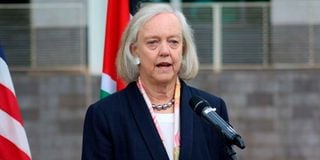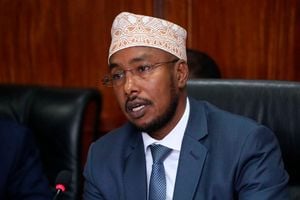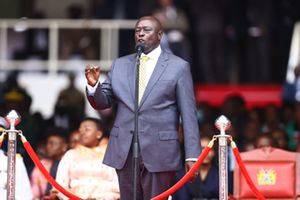
United States Ambassador to Kenya Meg Whitman during a press briefing at the US Embassy in Nairobi.
The United States of America (US) is latest to weigh in on the inordinate delay in appointing commissioners for the Independent Electoral and Boundaries Commission (IEBC), in the same week that the High Court overturned a decision by the Political Parties Disputes Tribunal.
"The IEBC's ability to support democracy in Kenya is at risk without the recruitment of commissioners or parliamentary action to provide the IEBC with funding for voter registration, by-elections, and other activities," the US Embassy said on Wednesday.
US Ambassador to Kenya Meg Whitman met IEBC CEO Hussein Marjan at Anniversary Towers in Nairobi on Wednesday to discuss areas of 'mutual cooperation'.
On Tuesday, the High Court overturned the ruling of the Political Parties Disputes Tribunal, which had declared National Liberal Party (NLP) leader Dr Augustus Kyalo the legitimate representative of small parties on the IEBC's selection panel.
Ambassador Koki Muli and the Azimio la Umoja One Kenya coalition had gone to court to appeal against the PPC's decision to appoint the NLP leader as the candidate.
Following the appeal, Lady Justice Janet Mulwa of the High Court on Tuesday, October 22, quashed and set aside the ruling of the Political Parties Dispute Tribunal.
In the judgment, the court ordered that fresh elections be held for a representative of the Coalition of Minority Political Parties in terms of Sections 1 and 2 of the IEBC (Amendment) Act, 2024.
It further directed that the election be held within 48 hours and no later than 1500 hours on Thursday October 24, 2024.
This followed the court's declaration that Dr Kyalo was not validly nominated and elected in the Minority Party/Coalition of Parties cluster under the IEBC Amendment Act.
While the ruling would have breathed new life into the panel's journey and set the stage for the appointment of new commissioners, Dr Kyalo threw a spanner in the works by filing an appeal against the ruling.
In his application, Dr Kyalo argued that "unless a stay is granted, the appeal will be rendered moot as the members of the IEBC Commission have a very limited and short tenure and by the time the appeal is heard, this body will be functus officio".
The Party of National Unity (PNU), an affiliate of the Raila Odinga-led Azimio coalition, has also challenged the High Court's decision, noting that the implications of the ruling will have far-reaching effects on the public interest now and in the future, hence the urgency of the matter.
"Further to the foregoing, the learned judge, by the implication of the judgment, has unintentionally contravened Section 2B of the First Schedule of the Independent Electoral and Boundaries Commission (Amendment) Act, 2024 by excluding certain political parties from active participation in the nomination process."
Dr Kyalo's National Liberal Party (NLP), through its Secretary-General Omondi K'Oyoo, had on Wednesday also written to Mr Odinga, the leader of the Azimio coalition, demanding that as a member of the coalition, the party "must be given the right to fully participate in the process of identifying and selecting the IEBC selection panelist representing the minority coalition".
"Failure to allow the National Liberal Party to participate in this crucial exercise is contrary to the principle of inclusivity and fairness as enshrined in the law," Mr K'Oyoo wrote.
The delay in reconstituting Kenya's electoral body has paralysed the process of filling vacant constituency and county seats and reviewing constituency boundaries.
While some constituencies have been without representation for more than a year because of the IEBC, there is a risk that constituency boundaries will not be drawn in time.
A total of 11 parliamentary and civic seats remain vacant but cannot be filled because the IEBC has not been reconstituted since January. Constituencies such as Banissa, Magarini and Ugunja have remained vacant due to deaths and annulments, despite the law requiring vacant seats to be filled within 90 days.
Banissa Constituency, for example, has been unrepresented for more than a year following the death of MP Hassan Kulow Maalim in March 2023.
According to the law, the IEBC should hold a by-election within 90 days. The election of Magarini MP Harrison Kombe was annulled on May 31, 2024.
President William Ruto's government has been accused of delaying the reconstitution of the IEBC in order to stack the commission with friendly individuals with an eye on the 2027 elections. However, the government cites the many court cases that have delayed the reconstitution of the commission.
Prof Peter Kagwanja, executive director of the Africa Policy Institute, says successive governments since the days of Daniel arap Moi in the 1990s have often sought to control the electoral body to influence the outcome of elections.
"If you look at the speed with which the impeachment of deputy president Rigathi Gachagua was carried out, it means that the IEBC could be reconstituted within a week," says Prof Kagwanja.
After the 2022 elections, the IEBC was left in disarray when the terms of the chairman, Wafula Chebukati, and two other commissioners, Boya Molu and Abdi Guliye, expired in January 2023. Four other commissioners - Juliana Cherera, Francis Wanderi, Justus Nyang'aya and Irene Masit - had earlier resigned after opposing the outcome of the 2022 presidential election.
According to Cyprian Nyamwamu, executive director of the Future of Kenya Foundation, the delay in reconstituting the IEBC serves two purposes: to prevent Kenyans unhappy with the performance of parliament from recalling their MPs, and as a last-minute strategy to set up the commission to rig the 2027 elections.
Meanwhile, the biggest challenge posed by the IEBC's absence is the likely failure, for the second time, to review constituency boundaries before the 2027 elections.
The boundary review of the 290 constituencies was due to be completed in July 2021, ahead of the 2022 elections. This time the review was to be completed by February 7, 2024. The last review took place in 2012.
Article 89 (2) requires the IEBC to review the names and boundaries at intervals of not less than eight years and not more than 12 years. This must be completed 12 months before the general election.
The review process is particularly sensitive as it involves reviewing the size and distribution of constituencies, which can affect political representation and resource allocation.
In mid-October, MPs called for a constitutional amendment to extend the boundary delimitation period due to the delay in reconstituting the IEBC.
The Justice and Legal Affairs Committee proposed that Article 89 on the delimitation of electoral units be amended to empower Parliament to extend the period for reviewing the names of constituency boundaries.
In 2021, the IEBC increased the population quota from 133,000 to 164,015 in its boundary review plan. This means that any constituency that does not meet the population quota would cease to exist if the review takes place.
"Halfway into Ruto's first term, Kenya risks running out of time to conduct a comprehensive boundary review with adequate public participation. Failure to review the boundaries could lead to crippling court cases and electoral paralysis," said Prof Kagwanja.
Questions have also been raised about President Ruto's appointment of Deputy President Designate, Prof Kithure Kindiki, without a fully constituted commission.
There are also fears that with Kenyans at loggerheads with their MPs, especially after the passage of the defunct Finance Bill, 2024, many may seek to invoke the recall clause against their lawmakers.








